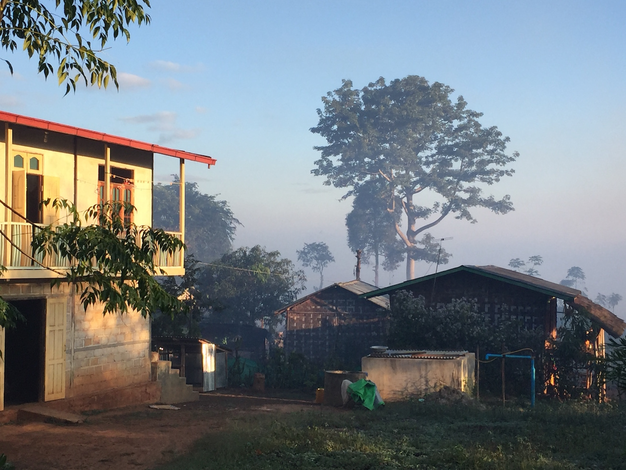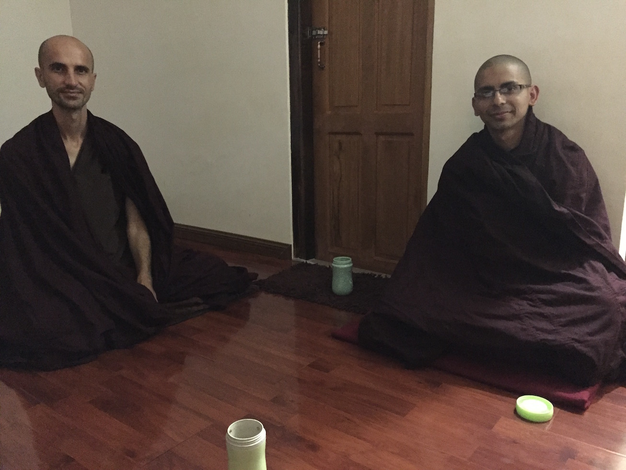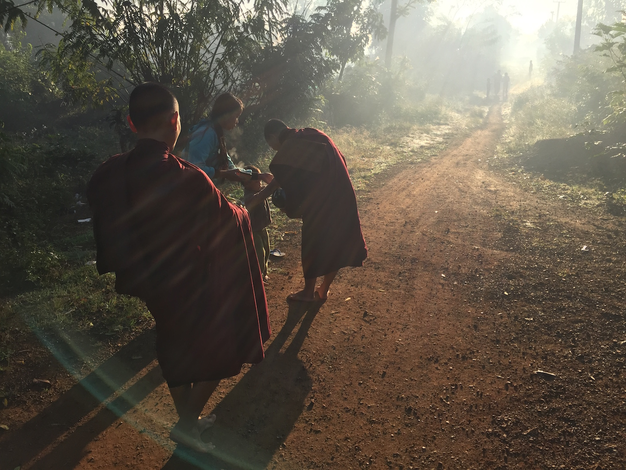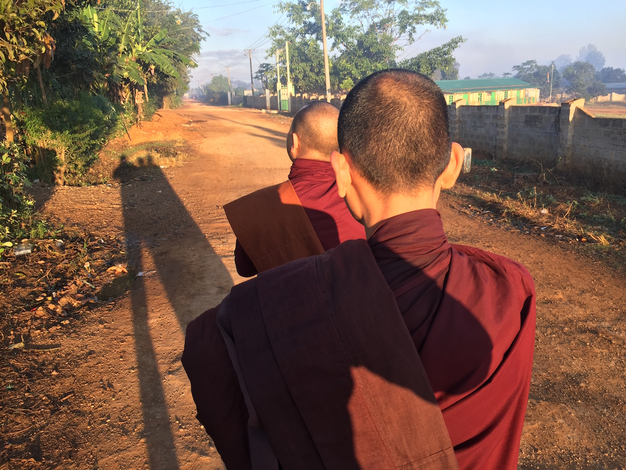3 questions to the brothers Dhamadassi & Thiracitta - Bikkhus at Pa Auk Forest Monastery

For the newcomer, the multitude of teachers (Sayadaws), schools and approaches is confusing. Best known in the west are the 10-day meditation retreats in the tradition of S. N. Goenka. They were recently popularized by Jack Dorsey, the CEO of Twitter whose tweets about a retreat in Pyin Oo Lwin sparked quite some internet debate. Fortunately, I had the support of our Myanmar Change Agent Network (MyCAN) members, namely Thet Su Hlaing and Mo Mo Theda, who sent me to Pa Auk Forest Monastery in Heho which is, as I soon discovered, something like a meditation university in the Theravada tradition. The system of meditation taught at Pa-Auk is strictly based on the original instructions by The Buddha as found in the Tipiṭaka (the Pāli Canon) and its commentaries. Most of the yogis here stay minimum a month but many also for a year to develop their practice. At Pa Auk, meditation is not simply an „awareness technique“ or a self-optimization tool (part 2 of the Jack Dorsey critique), it is a spiritual practice and a way of life.
8 hours of meditation 365 days a year
Life at the monastery follows the same strict schedule, 365 days a year. It starts at 4 a.m. with morning chanting and a 1,5 hour group sitting and ends with a Dhamma Talk by Sayadaw Bikkhu Revata. In total, it comprises 8 hours of meditation per day and for a newcomer, sitting that long in a meditation pose alone is a major challenge, not to mention keeping up the concentration. The two meals at 6.30 and 10.30 are beautiful highlights, both because of the (vegan) food as well as the community feeling. But besides life at the monastery offers few distractions. During the first five days I cherished the tranquility and strict schedule, but then I slowly started to feel its radicalism and implications. In a nutshell: It takes away all your options to project inner processes on external factors, like, other people. There is no way around the insight that you „produce“ your experiences, your life, moment by moment.
That is both enlightening as well as challenging. Luckily, I met the two incredibly nice, sincere and outspoken Bikkhus Dhammadassi and Thiracitta who helped me making sense of it.
Q: Dhamadassi, you have degree in aerospace engineering from the Netherlands which offers you a lot of options. Thiracitta, you were a tattoo artist with a colorful, free life. Why did you become monks?
T: I ran out of options. I tried everything else, experiencing life with all my senses. But I realized that after the stop button had to be pressed, because you have to stop it at a certain point or it will just stop by its nature, then the pleasure that it gave me just went away. And I was craving for more. It was ridiculous. And I said: I’m not gonna play this game. Clearly, this is not working. None of the senses is for transcendence, they are made for survival. But I don’t just want to survive in this life, I want to be happy, not just for a moment. I’m greedy, I want to be happy continuously, why not? I want to be in ecstasy, continuously, and if there is a way for that - I’ll do it. When I go to observing my mind, observing the breath, I can see continuity, I can see possibility, my questions are answered. When you are in silence, there are no more questions arising. All the answers are given.
Imagine doing a step, and that step is new. Doing another step, and it is new. Imagine everything is new, continuously, nothing is predictable. Someone asked me: oh, don’t you get bored? I haven’t been bored for years, because every moment is different. The awareness, it is getting sharper and sharper, and the sharper it gets the more you realize, the more you get out of it. So it is fantastic, it fills you up, continuously. At a certain point, the joy starts to arise, when you sit and meditate. And you’re curious again, like when we were kids and wanted to explore. I was living in the countryside, and sometimes, my parents would take me for a vacation, and I would discover a new garden, a deer in the field, and I would be: Wow! And it is always a new story. How could I quit that compared to something predictable the system gives me? What I’m trying to do is to make a transition between the selfish person that I am, which I know, and use this greed in a constructive way. You know, I already have this skill (laughing).
D: I’m from a Hindu background, and meditation is something my father actually really disliked. We have a lot of people in Nepal that leave their families, they become beggars, babas. For my family, the fear was, when you meditate, you become something like this. Even for myself, my concept of meditation was first that it has to do with belief, with something irrational. But when I went for my first 10-day Goenka course, the scientific nature of the approach really blew me away. I thought: wow, this is spirituality. (…) I was really changed, I totally flipped after I took the 10-day course. After that, my whole life has been about understanding Dhamma and inspiring others, and slowly, more of my friends and my family also got interested, only my father resisted. After my third course, I started understanding about the non-self, the voidness of being and existence, about creating ego, I wanted to go deeper, to understand the theory behind it. I started visiting monasteries, listening to talks. I realized how selfish I am, and I wanted to change this, this ego-thing hurt me very much. (…)
My plan at that point was already not to marry and to study Theravada Buddhism in Myanmar, I wanted to become a monk. When my father heard this, he was broken. It was a very difficult time for me. At the end, I made a contract with him: you go to the 10-day course, and I go to study anywhere in the world you want me to. I went to the Netherlands and did my bachelor in areospace engineering. He took the course and it was a beautiful experience for him. I came back after the bachelor to visit my family for four months, actually I was supposed to do my master in Germany then. But for me, Dhamma and Buddhist teaching were so important, something that I really wanted to preserve in myself. And then I got lucky - Aachen rejected me because the curricula did not fully match, so I could tell this to my father. Finally, I was free to do what I wanted to do, and I came here to become a monk.
For my father, it is still very difficult. Even though he took the 10-day course, he doesn’t understand: why do you have to do it the whole time, your whole life? He is living in society where the talk you have with your friends is only about your children and what they are doing. And now he has to explain everyone that I’m a Baba. The concept is that Babas are cowards that can’t do anything in the world and are running away.
Q: What is your most important learning since becoming a monk?
D: To be able to accept whatever comes, good or bad, ease or discomfort. Not just accept, rather embrace, with compassion, whatever weaknesses I see in myself, whatever goodness, just be kind to that. When I’m kind when it is a negative thing, then it becomes smaller and smaller, and maybe in the future, it will disappear. And if it is a good thing, it becomes bigger and bigger, and more fulfilling.
T: Patience. Patience is the best friend in spiritual evolution from my point of view. It frees you from the suffering of expectation, it gives you peace and comfort. It takes you out of the game. When you have patience, you just are. It makes you humble, it’s beautiful.
Q: What do you miss most?
T: Peanuts. I cannot have peanuts whenever I want.
D: I miss the care of my family.


